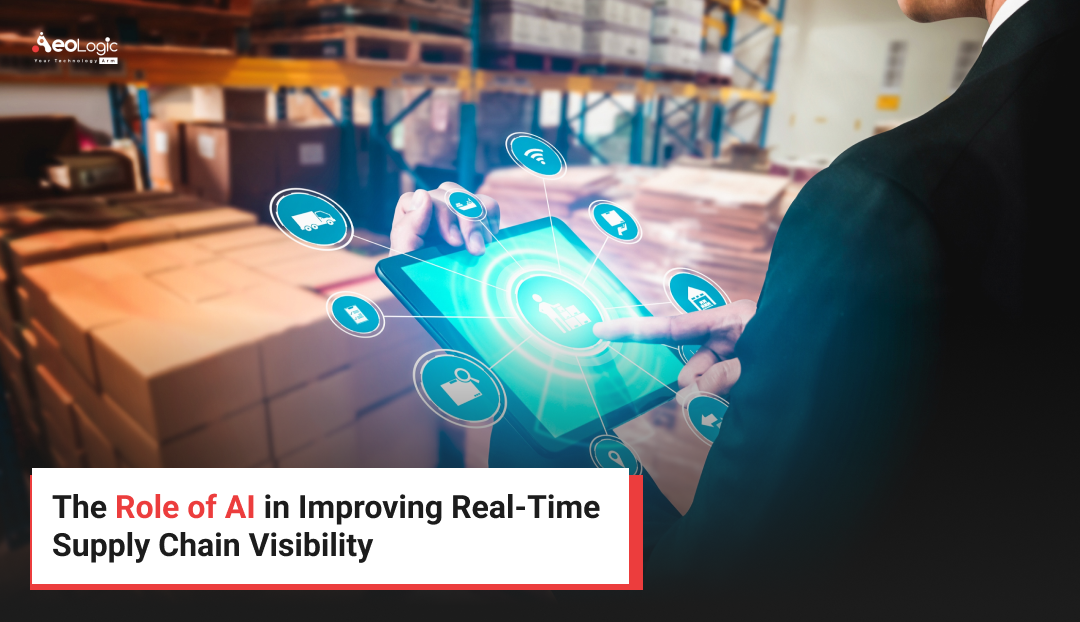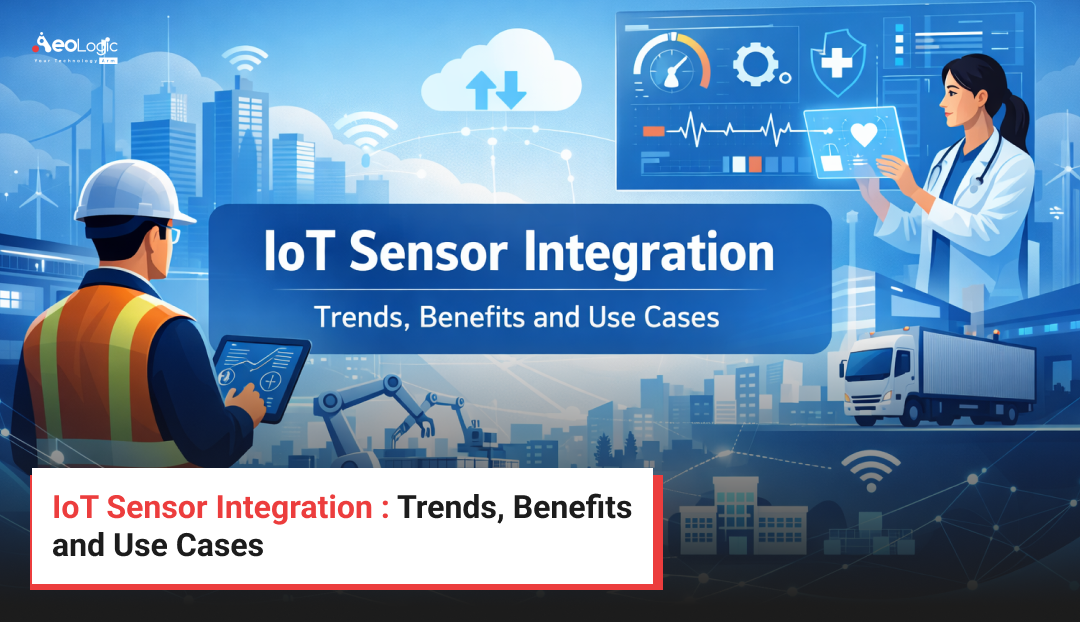The key to modern business success is to enhance its supply chain management. They are doing their best to enhance their supply chain with various tools and technologies. However, as the world is moving towards advancements, it is required to enhance visibility in the supply chain. It’s not just visibility, but also needs real-time visibility to make immediate decisions to tackle any situations. The IoT has done its best to enhance visibility, but for real-time visibility, the AI integration could be best. Various businesses have implemented this in their operations and are getting a lot of benefits with a lot of use cases.
Artificial intelligence (AI) automation solutions significantly improve real-time supply chain visibility by helping companies to better understand their operations, anticipate any disruptions, and streamline procedures. AI-powered solutions may manage and monitor assets, anticipate possible equipment breakdowns, and enhance supply chain communication, all of which increase efficiency and decision-making. This enables various benefits for the businesses, like enhanced monitoring and tracking, better communication channels to enhance collaboration, reduce risk, increase resilience, etc.
Related Statistics of AI in Supply Chain
The global AI in Supply Chain Market is projected to reach USD 157.6 billion by the end of 2033, with a remarkable Compound Annual Growth Rate (CAGR) of 42.7% over the forecast period from 2024 to 2033. 82% of supply chain organizations have adopted AI-driven quality control systems, leading to an 18% reduction in product defects.
Businesses using AI have experienced a 35% decrease in inventory levels, a 15% reduction in logistics costs, and a 65% improvement in service levels.
AI has been instrumental in boosting operational efficiency, with 68% of supply chain organizations integrating it for enhanced traceability and visibility, leading to a 22% increase in operational efficiency.
75% of supply chain professionals have leveraged AI-driven analytics to make data-informed decisions. AI can significantly improve demand forecasting accuracy, potentially reducing forecasting errors by up to 50%.
Explore more: The Importance of AI Solutions in Supply Chain Management
How AI in Supply Chain Enhances Real-Time Visibility
The AI in real-time supply chain visibility refers to leveraging AI, ML, and predictive analytics algorithms into a system to keep monitoring every aspect of the supply chain from raw to finished products. This helps businesses detect any problems in real time and take preventive action. This also enables us to keep the quality assurance till the finished products.
Overall, by converting unprocessed data into useful insights, artificial intelligence (AI) enables companies to better manage risks, make well-informed decisions, and optimize their supply chains for increased resilience and efficiency. The implementation of AI-powered real-time visibility surely helps businesses to gain competitive advantages.
Also Read: The Benefits of AI solutions for Supply Chain Management
Top Advantages of AI in Supply Chain Management
The AI for real-time supply chain visibility offers various benefits or advantages as follows: a few key benefits.
Improved Warehouse Efficiency
The AI integration in supply chain real-time visibility enhances the warehouse efficiency. The AI keeps an eye on warehouse movement of goods that travel time of inventory, shipping and packaging of goods, layouts, fulfillment rates etc. This helps businesses to manage their warehouse in real time without giving extra time and labor, which overall establishes a good warehouse management system.
Also Read: Using AI to Optimize Business Processes & Reduce Costs
Reducing Operating Costs
AI-powered real-time visibility monitors the supply chain to prevent any degradation in the quality of products, to prevent disruptions, to automate various repetitive tasks to reduce labor costs, etc. This helps businesses to save operational costs that they can use to make more strategic infrastructure development to make full use of AI.
Optimized Operations Through Simulations
By analyzing real-time data of supply chains, businesses can optimize operations through the simulations of AI with other technologies and solutions. The managers can integrate AI in conjunction with digital twins, graphical 3D representations of physical objects and processes, such as assembled goods or factory production lines, etc, to make operations more advanced and optimized than manual.
Explore more: Why AI Solutions are Key to Driving Business Growth
Improved Worker And Material Safety
The real-time visibility in supply chain operation with AI keeps updated about the risk factors like equipment failures, assembly lines, storage facilities, and shipping vehicles, and flags conditions, etc, that helps workers to assure their safety as well as material safety. This prevents unnecessary potential damage to the businesses and lives that create a good and trustworthy environment to work in.
Improved Supply Chain Sustainability
AI also establishes sustainability within the business by monitoring various operations in real time. The AI-powered supply chain reduces energy consumption by optimizing truckloads and delivery routes so trucks burn less fuel while delivering supplies. The real-time monitoring of inventory also helps businesses to remove unnecessary and expired stock to reduce wastage.
Also Read: How to Build a Custom AI Solution for Your Business 2025
Cost to Implement AI in Supply Chain for Improving Real-Time Visibility
By considering every factor while implementing AI in supply chain for real-time visibility, the estimated cost can be obtained. There are various factors like supply chain size, operations to monitor, complexity of infrastructure, etc.
A simple project might start at $10,000, while more complex projects could exceed $200,000. Additionally, the cost of AI-driven solutions can range from around $100 to $5,000 per month.
Custom AI models and solutions can range from $20,000 to $100,000 or more, while AI software development can cost between $60,000 and $200,000. Support and maintenance for AI-driven supply chain solutions can cost upwards of $20,000 per year.
Developing a Minimum Viable Product (MVP) for AI-powered supply chain solutions could cost between $30,000 and $60,000.
| Component | Estimated Cost Range (USD) |
|---|---|
| Basic AI Project | $10,000 – $50,000 |
| Complex AI Project | $100,000 – $200,000+ |
| AI Software Subscription (Monthly) | $100 – $5,000 / month |
| Custom AI Model Development | $20,000 – $100,000+ |
| AI Software Development | $60,000 – $200,000 |
| Support & Maintenance (Annually) | $20,000+ / year |
| AI Supply Chain MVP Development | $30,000 – $60,000 |
Also Read: Artificial Intelligence Solutions to Enhance Your Business
Major Problems of AI in Supply Chain
Data Quality and Availability
AI relies largely on accurate and complete data. Incomplete, outdated, or inconsistent data might result in incorrect insights and poor decisions.
High implementation costs
Integrating AI into supply chain operations necessitates large investments in infrastructure, software development, training, and continuing support.
Complex integration with legacy systems.
Many supply networks still use obsolete ERP or logistics systems. Integrating AI into these old platforms can be technically challenging and time-consuming.
Lack of Skilled Workforce
AI deployment necessitates knowledge in data science, machine learning, and supply chain management, which are still in short supply in many firms.
Security and Privacy Risks
With increased data flow and system interconnection, AI-driven supply chains confront more cybersecurity threats and data privacy compliance challenges.
Final Take
The future of AI in supply chain visibility will need a comprehensive strategy that incorporates real-time monitoring, predictive analytics, automated decision-making, and data-driven collaboration to build more effective, robust, and sustainable supply chains.
The emerging potential trends are going to favor supply chain visibility to make it more advanced than ever before. Overall, the advancement in AI and digital transformation will lead to more efficient and resilient supply chains that can anticipate disruptions and optimize operations in real time for business.
Aeologic Technologies offers cutting-edge AI solutions that can help businesses streamline their operations and achieve measurable cost savings. Overall, AI can enhance business situations in today’s market and could also be a long-term investment asset for businesses.
FAQs
How does AI work with IoT to enhance supply chain monitoring?
AI and IoT work hand-in-hand by collecting data from smart sensors placed across warehouses, vehicles, and production lines. AI then analyzes this data in real-time to track asset movement, monitor temperature or conditions, and trigger alerts for anomalies—ensuring end-to-end visibility.
What kind of data does AI use for real-time decision-making in the supply chain?
AI systems process structured and unstructured data including order history, inventory levels, shipment status, GPS data, weather forecasts, and market trends. This wide data range enables predictive modeling and faster, data-driven decision-making.
How does AI support predictive maintenance in the supply chain?
AI analyzes machine and equipment performance to predict potential breakdowns before they occur. This helps companies schedule timely maintenance, avoid unexpected downtime, and reduce repair costs—especially critical for logistics and warehouse automation.
What industries benefit the most from AI-driven supply chain visibility?
Retail, manufacturing, logistics, healthcare, and food industries see significant advantages. These sectors rely heavily on real-time tracking, inventory accuracy, and timely delivery—areas where AI enhances efficiency and responsiveness.
What are the long-term advantages of using AI in supply chain visibility?
In the long run, AI reduces operational risks, improves supply chain resilience, enhances agility during market fluctuations, and strengthens customer trust by offering transparency and faster delivery timelines.

I’m Deepika Pandey, an SEO strategist and content writer with 6+ years of experience. I create SEO-friendly content that drives traffic and engages readers. I combine data insights with creativity to help businesses grow their online presence effectively.







